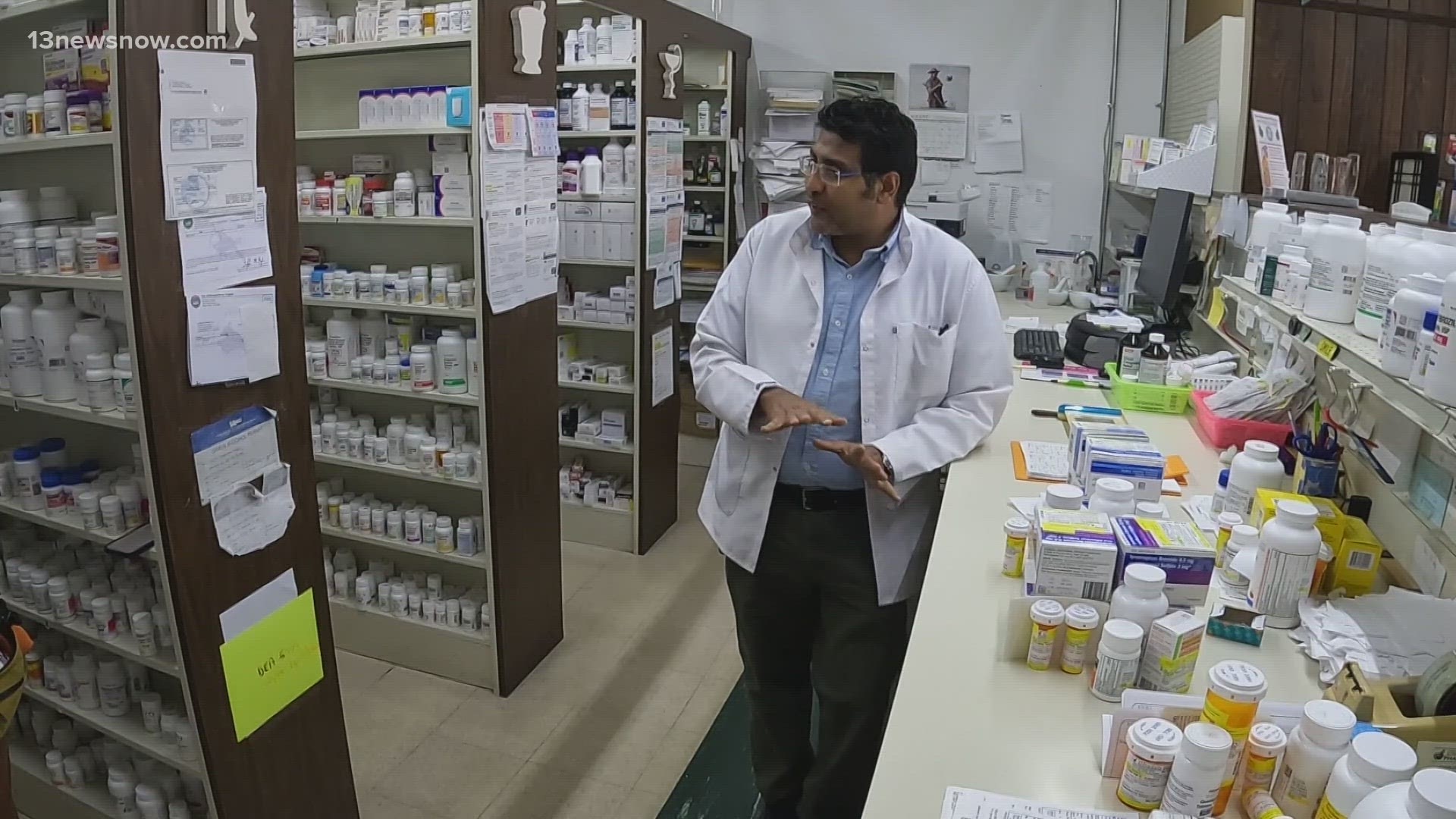NEWPORT NEWS, Va. — Armya Marae has personally seen the toll prescription drug prices can have on his local community.
Marae, who owns independent Glendale Pharmacy in Newport News, tells 13News Now how he's seen clients request a delay to their medication intake because of price and affordability.
"Making medication affordable in America, it’s something really good to start with. In my experience as an international pharmacist, I see the same brands for much cheaper prices over there," he said.
Looming price negotiations for 10 popular Medicare-covered prescription drugs would serve a greater good for the popular items in Marae's inventory.
"Having the prices lowered, it's something we [pharmacists] have dreamed of," he said.
President Joe Biden touted the potential cost savings of Medicare’s first-ever price negotiations for widely used prescription drugs on Tuesday as he struggles to convince Americans that he’s improved their lives as he runs for reelection.
The drugs include the blood thinner Eliquis, diabetes treatment Jardiance, and eight other medications. The negotiation process was authorized under the Inflation Reduction Act, which Biden signed last year, capping decades of debate over whether the federal government should be allowed to haggle with pharmaceutical companies.
Any lower prices won’t take effect for three years.
“For all of you out there, I get it, and millions of Americans get it,” Biden said at the White House. “I promise you. I’m going to have your back and I’ll never stop fighting for you on this issue.”
The drugs on the list announced Tuesday accounted for $3.4 billion in out-of-pocket costs for Medicare patients last year.
The Medicare program paid more than $50 billion for the drugs between June 1, 2022, and May 31, according to the Centers for Medicare and Medicaid Services, or CMS.
Marae noted that the price negotiations need to cut costs across the board, and be applied to manufacturers and distributors and not just the consumer.
"The lowering of the price is coming from where? Are you requiring manufacturer to lower the prices so that when we get it, for a lower price, Medicare reimburses us fairly for the prices? The difference in prices, where does it come from?" he asked.
The Inflation Reduction Act also calls for a $2,000 annual cap on how much people with Medicare have to pay out of pocket for drugs starting in 2025.
“We are here today with the firm belief that in the United States of America, no senior should have to choose between whether they fill their prescription or fill their fridge with food,” Vice President Kamala Harris said.
For drugs on the list released Tuesday, the government aims to negotiate the lowest maximum fair price. That could help some patients who have coverage but still face big bills like coinsurance payments when they get a prescription.
About 9% of Medicare beneficiaries age 65 and older said in 2021 that they did not fill a prescription or skipped a drug dose due to cost, according to research by the Commonwealth Fund, which studies health care issues.
Currently, pharmacy benefit managers that run Medicare prescription plans negotiate rebates off a drug’s price. Those rebates sometimes help reduce premiums customers pay for coverage. But they may not directly change what a patient spends at the pharmacy counter.
The federal government will benefit most from any lowered drug prices, noted Larry Levitt, an executive vice president for health policy at KFF, another non-profit that studies health care. But he said that if Medicare spends less on prescription drugs, then premiums for everyone with its drug coverage also should fall.
Drug companies that refuse to be a part of the new negotiation process will be heavily taxed.
The pharmaceutical industry has been gearing up for months to fight these rules. The lobbying group Pharmaceutical Research and Manufacturers of America said Tuesday that the drug list announcement stemmed from “a rushed process focused on short-term political gain rather than what is best for patients.”
“Many of the medicines selected for price setting already have significant rebates and discounts due to the robust private market negotiation that occurs in the Part D program today,” PhRMA CEO Stephen J. Ubl said in a statement.
PhRMA and several drug makers have filed lawsuits over the administration’s plan.
Republican lawmakers also have blasted the Biden administration, saying companies might pull back on introducing new drugs that could be subjected to future haggling. They’ve also questioned whether the government knows enough to suggest prices for drugs.

